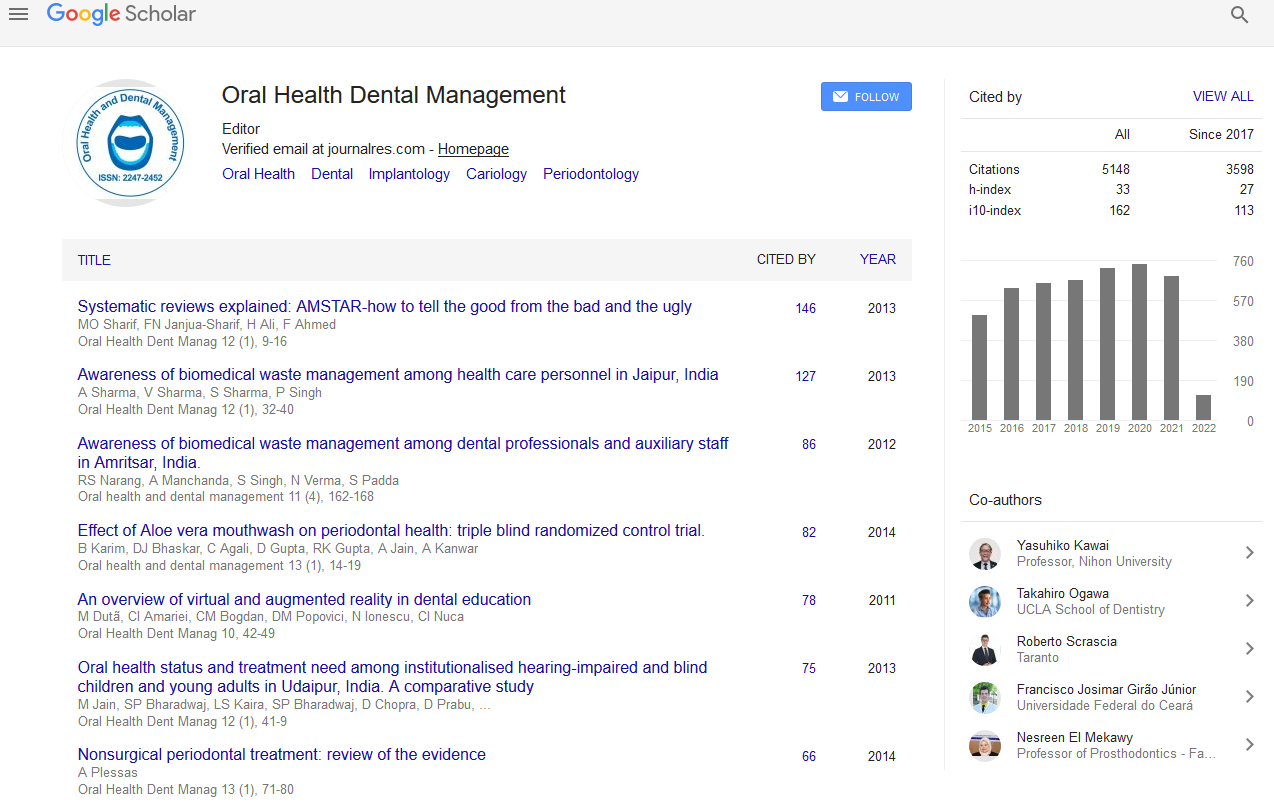Indexed In
- The Global Impact Factor (GIF)
- CiteFactor
- Electronic Journals Library
- RefSeek
- Hamdard University
- EBSCO A-Z
- Virtual Library of Biology (vifabio)
- International committee of medical journals editors (ICMJE)
- Google Scholar
Useful Links
Share This Page
Journal Flyer

Open Access Journals
- Agri and Aquaculture
- Biochemistry
- Bioinformatics & Systems Biology
- Business & Management
- Chemistry
- Clinical Sciences
- Engineering
- Food & Nutrition
- General Science
- Genetics & Molecular Biology
- Immunology & Microbiology
- Medical Sciences
- Neuroscience & Psychology
- Nursing & Health Care
- Pharmaceutical Sciences
The effect of antifungal combination on the expression level of subset genes in planktonic and biofilm Candida species
International Conference and Exhibition on Dentistry
March 18-20, 2015 Dubai, UAE
Himratul-Aznita W H and Nor Zulaila C O
Posters-Accepted Abstracts: Oral Health Dent Manag
Abstract:
Biofilm formation is more important than planktonic growth because this mode of growth is associated with oral Candida infections and their inherent resistance to antifungal chemotherapy. Combination of antifungal drugs from different classes and mode of action are being studied in order to determine a better strategy in combating antifungal resistance. The molecular mechanisms behind the resistance in Candida spp. are not yet understood. Therefore, the current study aimed to assess the expression of selected genes (MP65 and ERG3) responsible for Candida planktonic and biofilm resistance under the exposure to the combination of tunicamycin and amphotericin B. The expression of possible target genes (MP65 andERG3) in planktonic and biofilms of C. albicans and C. dubliniensis was analyzed by reverse transcription-PCR (RT-PCR) and quantitative PCR (qPCR) to investigate the molecular mechanisms of the inhibitory effects of TM + AmB. In this experiment, we found that the expression level of genes encoding enzymes involved in ergosterol biosynthesis (ERG3) and gene encodes for putative β-glucanase mannoprotein (MP65) in C. albicans planktonic and biofilm were down-regulated after 1h exposure to the TM + AmB, but the fold changes were not particularly high in biofilm form. However, the expression level of ERG3 and MP65 genes were highly down-regulated in both planktonic and biofilm of C. dubliniensis. In vitro analysis has shown that the combination of these antifungal, showed a strong activity against C. dubliniensis in planktonic and biofilm, but have moderate antifungal activity against cells of C. albicans in biofilm as the transcription levels of the ERG3 and MP65 genes were not highly down-regulated.
Biography :
Himratul-Aznita W H received her PhD in Oral Molecular Microbiology in 2004 from the University of Malaya, Kuala Lumpur, Malaysia. She is currently an Associate Professor in the Department of Oral Biology & Biomedical Sciences, Faculty of Dentistry, University of Malaya, Kuala Lumpur. Her primary field is microbiology with research emphasis of virulence of oral microorganisms specifically the oral Candida. Her research interest also covers the effects of medicinal plant extracts on the biological properties, adherence and molecular analysis of Candida species.

